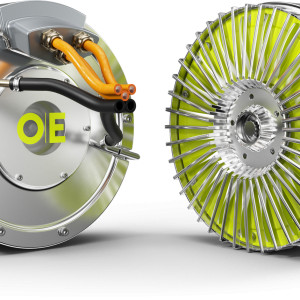Orbis Electric targets commercial vehicle market with new HaloDrive motor system


Electric motor manufacturer Orbis Electric has introduced HaloDrive, an axial flux motor-generator designed for commercial transportation and industrial applications. The system features a modular four-part architecture with an injection-molded plastic stator and adjustable gearset configurations.
The motor can be deployed across multiple sectors including commercial transportation, trucking fleets, passenger vehicles, marine systems, and aerospace platforms. Orbis positions the technology as an alternative to conventional Permanent Magnet Synchronous Motors currently used in electric vehicle applications.
According to the company, HaloDrive has been tested by passenger vehicle manufacturers for in-wheel propulsion systems and by heavy-duty trucking fleets as diesel replacement generators.
In commercial applications, Orbis reports the motor has improved one customer's fleet fuel efficiency by 61 percent.
"Our vision with HaloDrive is to significantly advance how businesses transition to electrification by removing electric motor barriers such as deployment costs, material and manufacturability risks, and performance limitations," said Chance Claxton, CEO of Orbis Electric. "With HaloDrive, we offer a high-performance axial flux motor that is not only highly efficient and powerful but also environmentally sustainable."
The motor system is designed to fit within vehicle wheels, which the company says reduces vehicle weight and can improve range by 20 percent. When configured as a generator, installation requires approximately three hours according to Orbis specifications.
One target application involves electric transport refrigeration units in commercial trucks. The HaloDrive system can be installed on drivetrains or axles to convert braking energy into electricity for mobile refrigeration systems, eliminating dependence on diesel-powered refrigeration units.
Orbis claims this configuration reduces diesel refrigeration fuel consumption to zero and operates at 90 percent lower cost than conventional systems.
The motor delivers torque density of 100 Newton-meters per kilogram and operates at up to 97 percent efficiency.
Orbis reports the system provides up to 35 percent lower drivetrain costs compared to radial flux motors while supporting multiple drivetrain positions without requiring structural modifications to vehicles.
"Our approach with HaloDrive is and always has been about creating a motor that not only meets the immediate electrification needs across a range of industries, but is also compact and efficient enough to position businesses for future energy and sustainability standards," said Marcus Hays, founder and CTO of Orbis Electric.
The company notes that transportation accounts for 39 percent of US carbon dioxide emissions and 12 percent globally, while inefficient electric motors consume one-third of global electricity.
Orbis estimates its technology could reduce emissions by 1.4 billion metric tons of CO2 if widely adopted.